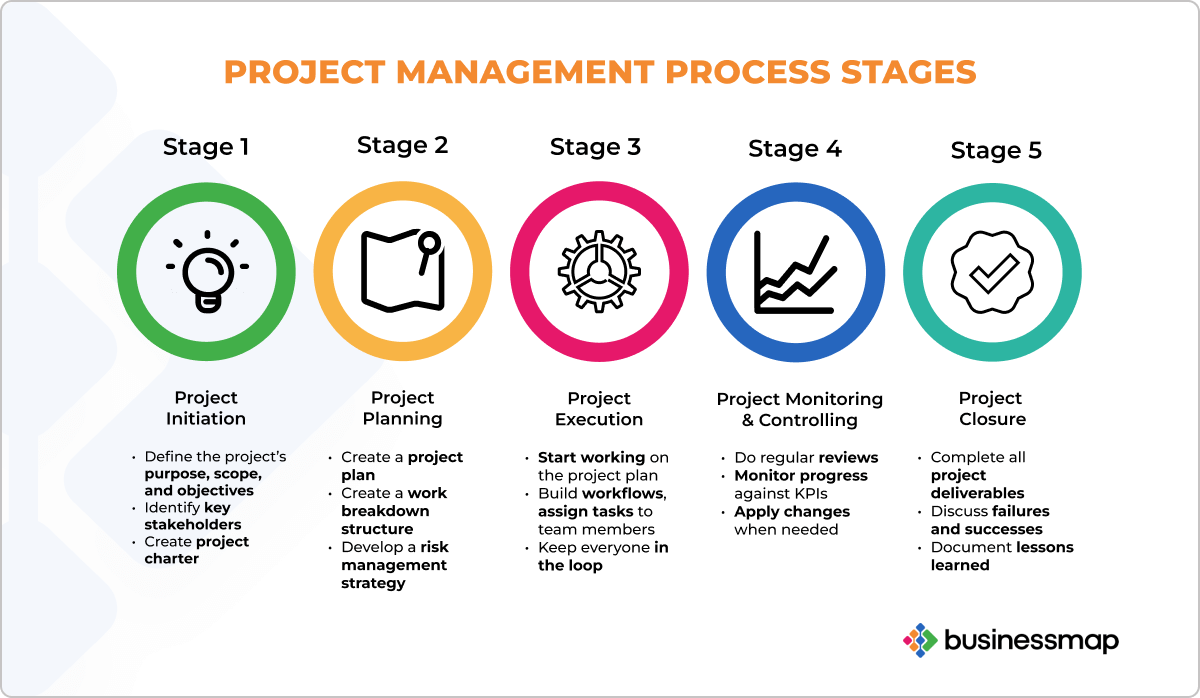From small-scale initiatives to large-scale endeavors, project management has proven its transformative power across various businesses of all sizes and industries. Data supports this statement by reporting that more than 90% of the organizations that adopt project management practices meet their initial business goals.
Irrespective of the project's scale, teams can reap substantial benefits from project management's diverse advantages. These include boosting productivity, fostering innovation, focusing on key objectives, and ensuring seamless workflow.
Whether you are a project manager seeking to optimize your strategies or a newcomer eager to grasp the fundamentals, understanding the essentials of project management and its advantages will help you overcome any roadblocks on the path to project management excellence and business growth.
Follow us as we explain the most important benefits of project management.
What Is Project Management?
Project management is the process of managing a project from its initiation to its completion, or the time when it is no longer needed. The goal of project management is to complete projects on time, within budget, and according to specifications. The process includes the following steps – project initiation (defining the project), planning for the project, managing the project, monitoring and controlling the project, and finally, project completion.

Projects are difficult to manage because they involve many different tasks and skills. These tasks are not always straightforward and can be very complex. That's why companies need to have someone who has a good understanding of the process involved in managing projects. The person responsible for this task is called a project manager. In this article, we will explain what are the most important benefits of project management as listed below.
16 Powerful Benefits of Project Management
From streamlined workflows to enhanced communication and strategic resource allocation, project management serves as the cornerstone of organizational efficiency and success.
Let’s unveil the most powerful benefits of project management.

1. Improved Customer Satisfaction
When a project is completed on time, within budget, and within scope, the customer is always satisfied, and a satisfied client is a repeat client. With ideal project management, you can cultivate a strong relationship with your customers, ultimately meeting and exceeding their expectations.
2. Organized and Easy to Manage Work
Project management aids teams in organizing, tracking, and executing work within a project. The goal of a project is to accomplish a collection of tasks. To meet your project's requirements on time, project management can help your team plan, manage, and execute work.
3. Clear Ownership Defined
The success of a project depends on many people working together. However, the project and team need a leader to take a broad view and drive the project forward. Each team member tends to focus on their specific responsibilities. The project manager, however, takes responsibility for the overall project. As a team leader, she handles issues, tracks milestones, and keeps the project on track.
4. Increased Team Accountability
Clear roles, responsibilities, and project plans foster accountability among team members, leading to greater ownership and commitment to project success. The project manager holds team members accountable for honoring their commitments. As a result, the project stays on track, and schedule slippages and missed dependencies are avoided.
5. Clearly Defined Project Goals
Project managers work with customers and teams to clearly define the scope before beginning the project. As a result, the team can outline requirements clearly, and everyone knows what to expect at the end of the project.
6. Optimized Budget and Cost Management
When planning a project, the project manager collects information on costs and creates a budget. As part of the project management process, she ensures that the project stays within budget without surprises.
7. Enhanced Project Schedule Management
Keeping the team on track is the responsibility of the project manager. Together with the team, she determines milestones and deliverables for the project. To ensure ongoing coordination and progress, she identifies and works with stakeholders to remove roadblocks and resolve issues. In addition, the PM manages interdependencies between team members so that all project components are coordinated as needed. She ensures that key dates and milestones are met. As the team's single point of contact, it is clear who coordinates and leads the effort. In this way, projects are more likely to succeed.
8. Efficient Project Scope Management
At the beginning of the project, a clearly defined scope is essential, but it is equally important to manage scope creep as the project progresses. Changes to the scope are frequently requested by customers. The PM can explain how these changes affect the project. In the event of scope changes, the project manager can manage the impact on the schedule and budget.
9. Mitigates Project Risks
It is critical to identify risks early in the process so they can be addressed before they become problems. Managing change throughout a project involves tracking changes and communicating them effectively. At the beginning of the project, the project manager identifies potential risks. Throughout the life of the project, she actively manages risk with the team. Therefore, even if the project plan is threatened, it keeps moving forward.
10. Problem Resolution
From the beginning, the project manager works with the team to ensure quality. The PM ensures the team follows the right processes, including gathering requirements and performing testing when necessary. Contract guidelines and compliance guidelines may need to be observed. During the course of a project, a PM coordinates multiple quality-related activities.
11. Record-Keeping and Administrative Responsibilities
The process of creating documentation and planning meetings doesn't require a project manager. Project managers are familiar with the project at a higher level and know when to schedule meetings and who to invite. To keep the project moving forward and on schedule, she anticipates and drives important project discussions. In addition to creating needed documents, she ensures that they are archived for compliance reasons.
12. Visibility to Project Health
Project managers provide visibility into project progress and status. The PM is responsible for the success of the project, so she gathers all the information and provides visibility into its health. Team members can access information and provide real-time status updates with the help of project management software. Stakeholders and team members can gain faster access to metrics and information. Based on this information, the team can proceed or adjust as necessary. Long-term, this saves the organization time and money.
13. Ability to Work on More Complex Projects
A more complex project requires greater guidance and management. More complex and risky projects can be completed with the assistance of a project manager.
14. Enhanced Team Building and Collaboration
To ensure that the project team works together toward a common goal, you must bring them together so that they can focus on the same objective. Conflicts, personal agendas, or competing desires could lead to stalling or churning of the project. An effective project manager knows how to assemble a team to work together for a common goal.
15. Clear and Better Communication Channels
Project management facilitates clear communication channels among team members, stakeholders, and clients, ensuring everyone is on the same page regarding project goals, progress, and challenges. In addition to email and phone calls, the project manager uses face-to-face meetings to communicate her ideas.
16. Adaptability to Change
In addition to completing the project work, the project manager ensures that the customers are ready to adopt. During the project management process, changes are planned to ensure a smooth transition to the revised solution. The project manager does this by using training for updated processes or solutions, ensuring ongoing support, and communicating about delivery and timing. As a result, customers have a better experience from start to finish.
How to Correctly Plan and Manage Project Management?
It is important to have a plan before you start any project. Furthermore, it is critical to manage the project and ensure that it is on time.
The first step in planning and managing a project is to decide what is the project's goal and who will be involved in it. You will need to determine what skills are required for the task, how much time it will take, and how much money will be required. The next step would be to decide on what kind of timeline would work best for the tasks at hand and then create an estimate of how long each stage of the project should take.
What Are the Most Beneficial Project Management Tools?
Now that you explore why project management is crucial for your business, it is time to experience the benefits for yourself. Considering the dynamic business environment, project management software is the single most effective instrument for facilitating project management practices. Given that the global market for PM platforms is steadily growing and is expected to expand by around 11% by the year 2030, choosing the solution that fits your unique process may be confusing.
To save you some time, we suggest trying out some of the best project management tools to ensure better project management: Businessmap (formerly Kanbanize), Asana, Proofhub, Monday.com, Zoho Projects, Trello, Wrinkle, Clarizen. The advantages of using project management tools are numerous, including keeping real-time track of task progress, having immediate access to analytics and reporting, and improved collaboration. Different project management tools have different functions. Some are designed to help with time management, others with task management, and some with budgeting and reporting.
Try Businessmap Free for 14 days
Mila Chervenkova
Marketing Expert | Agile, Kanban & OKR Practitioner
Mila is a seasoned marketing professional with a rich background in product marketing, content creation, and website optimization. Years of Practicing Kanban, Agile, and OKR practices have made her an expert in creating powerful productivity habits.



